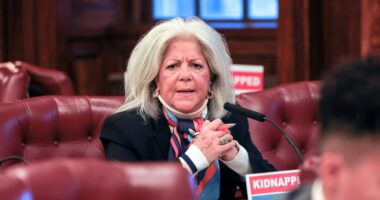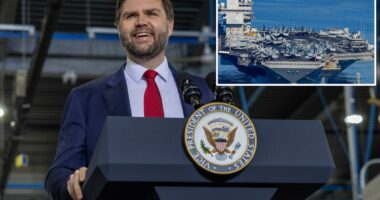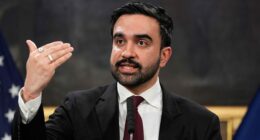Share this @internewscast.com

This week, during his visit to Asia, President Donald Trump took the opportunity to express his gratitude to regional allies who have supported his efforts to achieve a lasting resolution to the Israel-Hamas conflict. Among these allies, he offered particular commendation to Indonesia’s Prabowo Subianto for his contributions in Gaza.
In a statement at the Association of Southeast Nations summit in Malaysia, Trump extended his thanks to Malaysia and Brunei, along with a special mention of President Prabowo of Indonesia. “I want to thank Malaysia and Brunei as well as my friend, President Prabowo of Indonesia, for their incredible support of these efforts to secure the new day for the Middle East,” Trump declared. “It really is a new day.”
Following the fragile ceasefire and hostage agreement between Israel and Hamas, Indonesia has emerged as a notable partner for the White House, which is intent on cementing peace in the Middle East as a key aspect of Trump’s presidency. With the world’s largest Muslim population, Indonesia’s role in the region is becoming increasingly significant.
Trump’s administration has identified building on the Abraham Accords as a priority, conditional on the ceasefire holding steady. These accords previously established diplomatic and commercial relationships between Israel and countries such as the United Arab Emirates, Bahrain, and Morocco.
According to a senior White House official who briefed reporters under the condition of anonymity, a lasting peace agreement in Gaza could potentially open doors for Indonesia and even Saudi Arabia—the largest Arab economy and the cradle of Islam—to normalize relations with Israel. Such developments could mark a transformative shift in Middle Eastern diplomacy and underscore Trump’s legacy in the region.
White House officials believe that a permanent peace agreement in Gaza could pave the way for Indonesia as well as Saudi Arabia — the largest Arab economy and the birthplace of Islam — to normalize ties with Israel, according to a senior administration official who briefed reporters on the condition of anonymity.
For his part, Prabowo has shown eagerness to build a relationship with Trump and expand his nation’s global influence.
Earlier this month, at a gathering in Egypt to mark the ceasefire, Prabowo was caught on a hot mic talking to the U.S. leader about a Trump family business venture. He appeared to ask Trump to set up a meeting with the president’s son Eric, the executive vice president of the Trump Organization, which has two real estate projects underway in Indonesia.
But Indonesia, much like Saudi Arabia, has publicly maintained it can’t move forward on normalizing relations with Israel until there’s a clear pathway set for a Palestinian state.
“Any vision related to Israel must begin with the recognition of Palestinian independence and sovereignty,” said Indonesian Foreign Ministry spokesperson Yvonne Mewengkang.
Could Trump’s dealmaking pave the way?
There may be a reason for the administration to be hopeful that the ceasefire deal has created an opening for Indonesia to soften its position. The White House might also have some cards it could play as it pitches Prabowo.
Jakarta badly wants to join the Organization for Economic Co-operation and Development and Trump’s backing would be pivotal. Indonesia views joining the 38-member OECD as an opportunity to raise Indonesia’s international profile, access new markets, and attract investment from other organization members.
Greater U.S. investment in Indonesia’s rare earths industry could also be inviting to Jakarta, which boasts a top-20 world economy.
Indonesia has set its sights on dominating the global nickel market, and is already responsible for about half of the metal used around the world. Demand has skyrocketed as automakers need it for electric vehicle batteries and clean electricity projects that require larger batteries.
“Trump’s transactional dealmaking opens up possibilities that otherwise might not exist,” said Daniel Shapiro, a former top State Department official who worked on Israel-Indonesia normalization efforts during the Biden administration. “If the Indonesians have something they’re seeking from the United States — whether it’s in the realm of tariff relief, other types of trade arrangements, or security arrangements — this could represent an opportunity.”
Indonesia pledged troops and helped with Trump’s 20-point plan
Indonesian officials were among a small group of leaders from Muslim and Arab nations whom the White House used as a sounding board to help the administration fine-tune Trump’s 20-point ceasefire and hostage proposal. And Trump at this week’s summit in Malaysia again conferred with Prabowo and other leaders about U.S.-led efforts to maintain the ceasefire in Gaza, according to a White House official who was not authorized to comment publicly about the private leaders’ conversation.
And Prabowo, at the annual gathering of world leaders at the United Nations General Assembly days before the ceasefire agreement was reached, pledged 20,000 Indonesian troops for a prospective U.N. peacekeeping mission in Gaza. In the remarks, Prabowo reiterated his country’s call for “an independent Palestine” but underscored the need to “recognize and guarantee the safety and security of Israel.”
Rabbi Marc Schneier, a president for the interfaith group Foundation for Ethnic Understanding and an advocate of the Abraham Accords effort, said Prabowo’s pledge for troops and his rhetoric about Israel suggest that the Indonesian leader could be primed to make the leap.
“Yes, he’s talking about a Palestinian state, but he’s also being clear that he wants a Palestinian state that does not come at the expense of a Jewish state,” Schneier said. “That’s what gives me hope.”
Indonesia’s historic backing of Palestinian state
Trump met with Prabowo and other leaders soon after the U.N. remarks, and seemed as impressed with the Indonesian president’s style as he was with the pledge to a peacekeeping mission. Trump said he particularly enjoyed watching Prabowo “banging on that table” in his U.N. speech.
But Prabowo is likely to face deep skepticism from the Indonesian public on Israel normalization efforts.
Indonesian leaders, dating back to the Republic’s first president, Sukarno, have sought to burnish an image of “a country that leads the fight against world colonialism,” said Dina Sulaeman, a scholar at Padjadjaran University in Bandung, Indonesia. The country had a protracted struggle for independence, freeing itself from Dutch colonial rule in its late 1940s revolution.
Indonesian leaders’ historical support for Palestinian statehood is also at odds with the current government in Israel, led by Prime Minister Benjamin Netanyahu, which remains adamantly opposed to a two-state solution.
“So, if Indonesia suddenly wants to join the Abraham Accords and normalize Israel’s occupation of Palestine, the good image that the Indonesian government has built … over decades will collapse,” Sulaeman said.
The Trump administration had talks with the Indonesians about joining the Abraham Accords in its first term. The Biden administration, which tried to pick up on the normalization effort, also had “serious talks” with the Indonesians, Shapiro said.
Shapiro said he was directly involved in talks between the Biden administration and senior Indonesian officials about using a November 2023 state visit by then Indonesian President Joko Widodo to offer preliminary announcements “about moving forward” on a normalization effort. But the Hamas Oct. 7, 2023, attack on Israel scuttled the effort.
“My judgment is there is good possibility, assuming the ceasefire holds,” Shapiro said of Trump’s chances of getting Jakarta to sign the accords. “How and when that deal can begin to take shape — that remains to be seen.”
___
Tarigan reported from Jakarta.
















